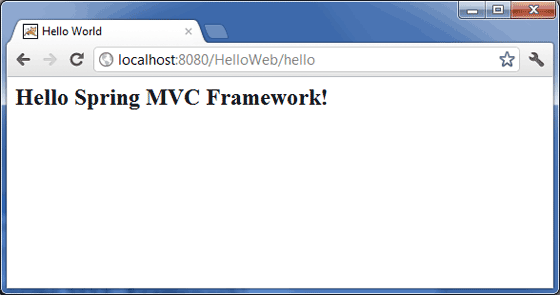SpringMVC-HelloWorldの例
次の例は、単純なWebベースの記述方法を示しています。 Hello WorldSpringMVCフレームワークを使用するアプリケーション。まず、動作するEclipse IDEを配置し、次の手順に従って、Spring WebFrameworkを使用して動的Webアプリケーションを開発します。
| ステップ | 説明 |
|---|---|
| 1 | 名前を付けて動的Webプロジェクトを作成する HelloWeb 作成したプロジェクトのsrcフォルダーの下にパッケージcom.tutorialspointを作成します。 |
| 2 | 次のSpringおよびその他のライブラリをフォルダにドラッグアンドドロップします WebContent/WEB-INF/lib.. |
| 3 | Javaクラスを作成する HelloController com.tutorialspointパッケージの下。 |
| 4 | Spring構成を作成する files web.xml そして HelloWeb-servlet.xml WebContent / WEB-INFフォルダーの下。 |
| 5 | 名前を付けてサブフォルダーを作成します jspWebContent / WEB-INFfolderの下。ビューファイルを作成するhello.jsp このサブフォルダーの下。 |
| 6 | 最後のステップは、以下で説明するように、ソースファイルと構成ファイルのコンテンツを作成し、アプリケーションをエクスポートすることです。 |
HelloController.java
package com.tutorialspoint;
import org.springframework.stereotype.Controller;
import org.springframework.web.bind.annotation.RequestMapping;
import org.springframework.web.bind.annotation.RequestMethod;
import org.springframework.ui.ModelMap;
@Controller
@RequestMapping("/hello")
public class HelloController{
@RequestMapping(method = RequestMethod.GET)
public String printHello(ModelMap model) {
model.addAttribute("message", "Hello Spring MVC Framework!");
return "hello";
}
}web.xml
<web-app id = "WebApp_ID" version = "2.4"
xmlns = "http://java.sun.com/xml/ns/j2ee"
xmlns:xsi = "http://www.w3.org/2001/XMLSchema-instance"
xsi:schemaLocation = "http://java.sun.com/xml/ns/j2ee
http://java.sun.com/xml/ns/j2ee/web-app_2_4.xsd">
<display-name>Spring MVC Application</display-name>
<servlet>
<servlet-name>HelloWeb</servlet-name>
<servlet-class>
org.springframework.web.servlet.DispatcherServlet
</servlet-class>
<load-on-startup>1</load-on-startup>
</servlet>
<servlet-mapping>
<servlet-name>HelloWeb</servlet-name>
<url-pattern>/</url-pattern>
</servlet-mapping>
</web-app>HelloWeb-servlet.xml
<beans xmlns = "http://www.springframework.org/schema/beans"
xmlns:context = "http://www.springframework.org/schema/context"
xmlns:xsi = "http://www.w3.org/2001/XMLSchema-instance"
xsi:schemaLocation = "
http://www.springframework.org/schema/beans
http://www.springframework.org/schema/beans/spring-beans-3.0.xsd
http://www.springframework.org/schema/context
http://www.springframework.org/schema/context/spring-context-3.0.xsd">
<context:component-scan base-package = "com.tutorialspoint" />
<bean class = "org.springframework.web.servlet.view.InternalResourceViewResolver">
<property name = "prefix" value = "/WEB-INF/jsp/" />
<property name = "suffix" value = ".jsp" />
</bean>
</beans>hello.jsp
<%@ page contentType = "text/html; charset = UTF-8" %>
<html>
<head>
<title>Hello World</title>
</head>
<body>
<h2>${message}</h2>
</body>
</html>以下は、Webアプリケーションに含まれるSpringおよびその他のライブラリのリストです。これらのファイルをドラッグしてドロップするだけです–WebContent/WEB-INF/lib フォルダ。
servlet-api-x.y.z.jar
commons-logging-x.y.z.jar
spring-aop-x.y.z.jar
spring-beans-x.y.z.jar
spring-context-x.y.z.jar
spring-core-x.y.z.jar
spring-expression-x.y.z.jar
spring-webmvc-x.y.z.jar
spring-web-x.y.z.jar
ソースファイルと構成ファイルの作成が完了したら、アプリケーションをエクスポートします。アプリケーションを右クリックして、Export → WAR File オプションとあなたの保存 HelloWeb.war Tomcatのファイル webapps フォルダ。
次に、Tomcatサーバーを起動し、標準のブラウザーを使用してwebappsフォルダーから他のWebページにアクセスできることを確認します。ここで、URLにアクセスしてみてください-http://localhost:8080/HelloWeb/hello。Spring Webアプリケーションで問題がなければ、次の画面が表示されます。

指定されたURLで、 HelloWebはアプリケーション名で、helloは仮想サブフォルダーです。これはコントローラーで@RequestMapping( "/ hello")を使用して説明しました。を使用してURLをマッピングするときにダイレクトルートを使用できます@RequestMapping("/")、この場合、短縮URLを使用して同じページにアクセスできます http://localhost:8080/HelloWeb/、ただし、フォルダごとに異なる機能を使用することをお勧めします。